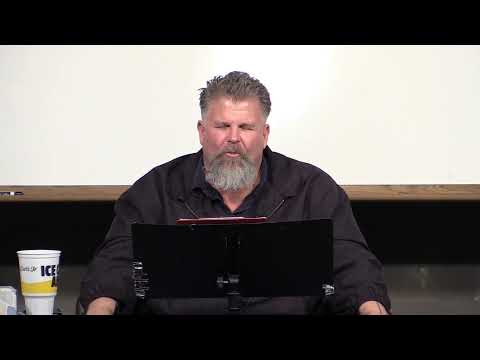
Luke 16:13-23 Bible Teaching
Jesus teaches the impossibility of serving both God and wealth, using the parable of the rich man and Lazarus to illustrate spiritual consequences and the importance of prioritizing God over material desires.

Jesus teaches the impossibility of serving both God and wealth, using the parable of the rich man and Lazarus to illustrate spiritual consequences and the importance of prioritizing God over material desires.

Paul and Shawn teach salvation as a journey of faith, not law, emphasizing God's role and personal responsibility. Live righteously, avoid false teachings, and practice love and humility.

The teaching contrasts the prodigal son's parable with the unjust steward's, highlighting themes of grace, forgiveness, accountability, and wise use of resources for spiritual growth.

Paul's letter to Philippians emphasizes Jesus' humility and obedience, Shawn's teaching highlights redemption through Christ's death, and the promise of eternal life.

Luke 15's parables of the lost sheep, coin, and prodigal son highlight repentance, redemption, and joy, emphasizing God's joy in sinners' repentance and the value of individual restoration.

Paul's teaching in Philippians 2:6-11 highlights Christ's humility, choosing servitude and death over divine privilege, emphasizing humility and obedience for believers.

Shawn's teaching uses Jesus' parable of a great feast to illustrate the Kingdom of God, emphasizing humility, service, open invitation, and prioritizing faith over worldly ties.

Paul urges Philippians to unity through humility, love, and shared purpose, inspired by Christ's example. Emphasizes selflessness, spiritual fellowship, and agape love.

Paul: Unity, personal conduct, faith's eternal aspects. Shawn: Discern spirits, mind of Christ, faith beyond reason. Both: Suffering, humility, shared belief, love, servitude.

Jesus challenges Pharisees' Sabbath views by healing, teaching compassion over legalism. Emphasizes humility, inviting marginalized, promising divine rewards over earthly.

Jesus teaches striving for the narrow gate to God's Kingdom, warns of exclusion for delay, laments Jerusalem's resistance, and predicts Gentiles' inclusion and Pharisees' delay.

Paul and Shawn teach that true Christian life involves self-sacrifice, embodying Christ's virtues, prioritizing spiritual values, and serving others, leading to eternal peace.

Luke 13: Jesus teaches repentance, not tragedy, as a sign of sin. Parables of the fig tree, mustard seed, and leaven stress spiritual growth. He heals on the Sabbath, challenging legalism.

Shawn discusses Paul's reflections on imprisonment, emphasizing salvation for all through faith, Jews' historical role, and the inclusive nature of God's covenant.

Jesus stresses prioritizing God's kingdom, spiritual readiness, and internal righteousness. He warns of division, accountability, and the need for reconciliation.

Paul's prayer for Philippians stresses discerning love, sincerity, and righteousness. Despite imprisonment, he rejoices in the Gospel's spread, valuing genuine motives.

Shawn emphasizes reliance on the Holy Spirit, prioritizing spiritual over material wealth, and trusting God's provision, warning against covetousness and worldly concerns.

Paul's letter to Philippians, written during his Roman imprisonment, reflects gratitude for their support, emphasizes collaborative church leadership, and assures God's ongoing work in believers.

Shawn's teaching highlights religious leaders obstructing spiritual truths, Jesus' warnings on Pharisees' hypocrisy, God's dual authority, and unforgivable blasphemy against the Holy Spirit.

Paul's teaching in Ephesians emphasizes spiritual armor: truth, righteousness, faith, salvation, God's word, and prayer for spiritual warfare, highlighting preparedness and defense.

Paul and Shawn emphasize spiritual warfare, the armor of God, and Christ's victory over Satan. Shawn highlights Satan's temporary dominion, Christ's triumph, and the ultimate establishment of God's kingdom.

Jesus criticizes Pharisees for hypocrisy, focusing on rituals over inner purity, neglecting justice and love. Emphasizes humility, equality, and true spiritual integrity.

Paul advises fathers to nurture children with love, avoiding anger. He extends respect to servants and masters, urging sincere devotion. Shawn contrasts true Christianity with historical misuse, emphasizing love and freedom.

Shawn's teaching asserts "this generation" in Jesus' words refers to his contemporaries, not future audiences, emphasizing repentance, inner light, and true wisdom over worldly pursuits.

Jesus warns against division, counters accusations of using demonic power, emphasizes God's kingdom, and stresses internal unity and adherence to God's word for true blessings.

Husbands should love wives as Christ loves the church, nurturing and self-giving. Marriage mirrors Christ's bond with the church, emphasizing mutual love, respect, and sacrifice.

Jesus' power over demons shows God's might; neutrality isn't an option in spiritual battles. Satan, once a proud angel, fell and tempts humanity. Jesus' victory over Satan leads to spiritual renewal and eternal life for believers.

Shawn and Paul teach submission rooted in humility, promoting unity and respect in relationships. Emphasizing mutual respect in marriage, they reflect Christ's love and sacrifice.

Paul and Shawn emphasize living as children of light, discerning God's will, avoiding excess, and being Spirit-filled. They stress wise living, love, humility, and mutual respect.

Jesus taught prayer as a relationship with God, emphasizing persistence, forgiveness, and divine provision. Shawn highlights differences in Gospel accounts, focusing on praying to the Father, the role of Jesus' name, and the Kingdom's fulfillment. Persistence in prayer is key, with spiritual gifts prioritized over material needs.